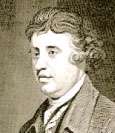Edmund Burke
(January 12,1729 -July 9,1797)
Edmund Burke was born in Dublin, January 12, educated at a Quaker boarding school and atTrinity College, Dublin. In 1750 he entered the Middle Temple, London, but soon abandoned law for literary work. His Vindication of Natural Society was published in 1756, as was also hisPhilosophical Inquiry into the Origin of our Ideas of the Sublime and Beautiful. From 1761 to 1783 he was back in Dublin as private secretary to the Marquis of Rockingham, at that time premier, and entered Parliament for the pocket borough of Wendover. His eloquence once gained him a high position in the Whig party. Rockingham's administration lasted only one year. Although Burke held no public office until the downfall of the North ministry in 1782, Burke's public activity never ceased. Lord North's long administration (1770-1782) was marked by the unsuccessful coercion of the American colonies, by corruption, extravagance, and reaction. Against this policy Burke and his Whig friends could only raise a strong protest.
The best of Burke's writings and speeches belong to this period, and may be described as a defense of sound constitutional statesmanship against prevailing abuse and misgovernment. "Observations on thePresent State of the Nation "(1769) was a reply to George Grenville;On the Causes of the Present Discontents (1770) treats the Wilkes controversy. Perhaps the finest of his many efforts are the speech onAmerican Taxation (1774), the speech onConciliation with America (1775), and theLetter to the Sheriffs of Bristol (1777). These speeches advocated wise and liberal measures which Burke believed would have averted the troubles which ensued.
Burke never systematized his political philosophy. It emerges out of the aforementioned writings and speeches. Opposes to the doctrine of natural rights, yet he takes over the concept of the social contract and attaches to it divine sanction. But his support of the proposals for relaxing the restrictions on the trade ofIreland with Great Britain, and for alleviating the laws against Catholics, cost him the seat at Bristol (1780), and from that time until 1794 he represented Malton. When the disasters of the American War brought Lord North's government to a close, Burke was paymaster of the forces under Rockingham (1782) and also under Portland (1783), After the fall of the Whig ministry in1783, Burke was never again in office. In 1788 he opened the trial of Warren Hastings by the speech which will always rank among the masterpieces of English eloquence.
Burke'sReflections on the Revolution in France (1790) was read all over Europe and encouraged its rulers to resist, but his opposition to it cost him the support of his fellow Whigs, notably that of Fox. In hisAppeal from the New to the Old Whigs,Thoughts on French Affairs, andLetters on a Regicide Peace, he goes further, urging the government to suppress free opinions at home.
Burke had vast knowledge of political affairs, a glowing imagination, passionate sympathies, and an inexhaustible wealth of powerful and cultured expression. However, his delivery was awkward and speeches which today captivate the reader only served to empty the benches of the House of Commons (some speeches were in excess of eight hours).
One of the foremost political thinkers of 18th century England, Burke died July 9, 1797, and was buried in a little church at Beaconsfield.
Taken from:
http://www.historyguide.org/intellect/burke.html
Also see:http://en.wikipedia.org/wiki/Edmund_Burke
http://www.blupete.com/Literature/Biographies/Philosophy/Burke.htm